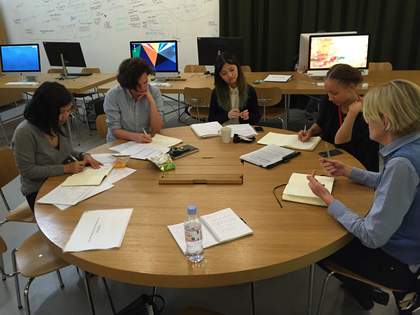
Practice as Research group meeting, 2015
What is practice as research?
Supporting the development of professional practice as research in the Learning Department.
This includes the development of:
- Practitioner-researchers through professional development and the advocacy of rigorous reflective practice
- Research events that generate and share new knowledge on key issues and concerns relevant to researchers, practitioners, artists and educators in the field
- Innovative methods to disseminate and share learning and resources to support research across the sector
This programme will result in the production of resources: online and in print that provide toolkits, guidance and advice for conducting practice as research projects. Practice as researchers will document, evaluate and disseminate their research through research events, talks and presentations. The aim is to make visible the history of practice as research and to build a network to share knowledge nationally and internationally.
Who are the Practice as Researchers?
- Rachel Noel Assistant Curator: Young People’s Programmes
- Emma McGarry Resource Co-ordinator: Schools and Teacher’s Programme
- Luisa Ulyett Assistant Curator: BP Art Exchange
- Emily Stone Assistant Curator, Public Programmes
- Chinami Sakai Assistant Curator, Families and Early Years (now left)
What are the Practice as Research Projects?
- Rachel Noel: Aims to assess the value of performance in improving access to the arts for learning disabled young people. Rachel’s research has informed the development of a 12 week project for disabled people and the production of a film as an evaluation tool that will explore what changes for participants as a result of taking part.
- Emma McGarry: Addresses the significance of language in relation to race and cultural difference, and how can art and artists’ practice be used to support open conversation and around these issues in the classroom. This research feeds into the development of a classroom resource for 14-18yr olds to support Art & Design curriculums at GCSE, BTEC, AS and A Level. (Will be published in spring 2016)
- Emily Stone: Explores how the gallery can can support practice sharing and critical reflection for participants with learning disabilities. This project has evolved into a collaboration between Tate, Corali a dance and movement organisation and Into Art a predominantly visual art based organisation. The project is evolving into a series of public events, workshops and professional development initiatives.
- Chinami Sakai: Considers how the Families and Early Years team can provide a space of mutual learning for practicing artists, children age 8-14, and ourselves in-gallery that is informed by the models and methodologies in current live art practices.
- Luisa Ulyett: Assesses online engagement with audiences looking at what motivates and constitutes meaningful engagement. This research feeds into the management of the online platform, how to best foster and grow the community through both the digital and offline programme.
What does the Practice as Research process involve?
Working with the group to:
- specify a research inquiry at the outset (questions)
- build moments of critical reflection into the project
- in documenting process, capture moments of insight
- locating praxis in lineage of similar practices
- relate specific inquiry to broader contemporary debate (references)
How do we do this?
- A series of group forums where we share projects, exchange references and critical feedback
- 1-2-1 meetings offering advice and support for the development of individual projects
- Documentation and evaluation of these meetings: photographing, audio recording notes on reflection and analysis of projects (Basecamp)
- The development of projects through written research proposals
- Establishing a timeline, project outcome and identifying appropriate methods of evaluation and dissemination
- Dissemination of research through presentations at cross site research meetings and Tate Research Centre Learning website
- Practice as researchers own learning and development that feeds back into their programs through the development of projects
Testimonials from Practice as Researchers:
‘The thing that stuck in my head after the practice as research meeting was that the research should initiate change. That these changes become the outcomes and importance of the research in and of itself. I knew this before but I think I had forgotten, or side-lined it, in favour of talking/reading about what the research was addressing, rather than feeding it directly back into practice.’
‘The session helped focus my ideas. It also reinforced what I was most interested in and where I should steer my research, which is to look at what motivates audiences to engage digitally. Stemming from that also looking at what is the motivation behind exchange? What is meaningful engagement?’
‘It was great to receive feedback from Helena and Emily, particularly the very practical steps I need to take to move my project forward for example documentation in the shape of diaries or logs, creating a timeline to record how the project progresses.’
